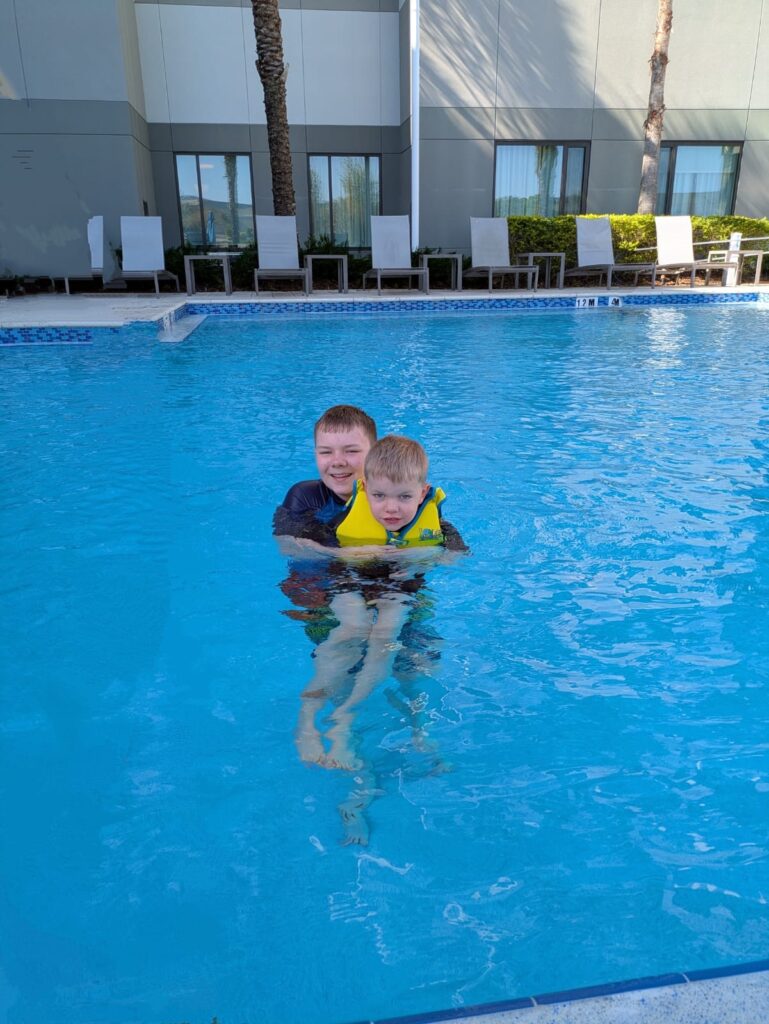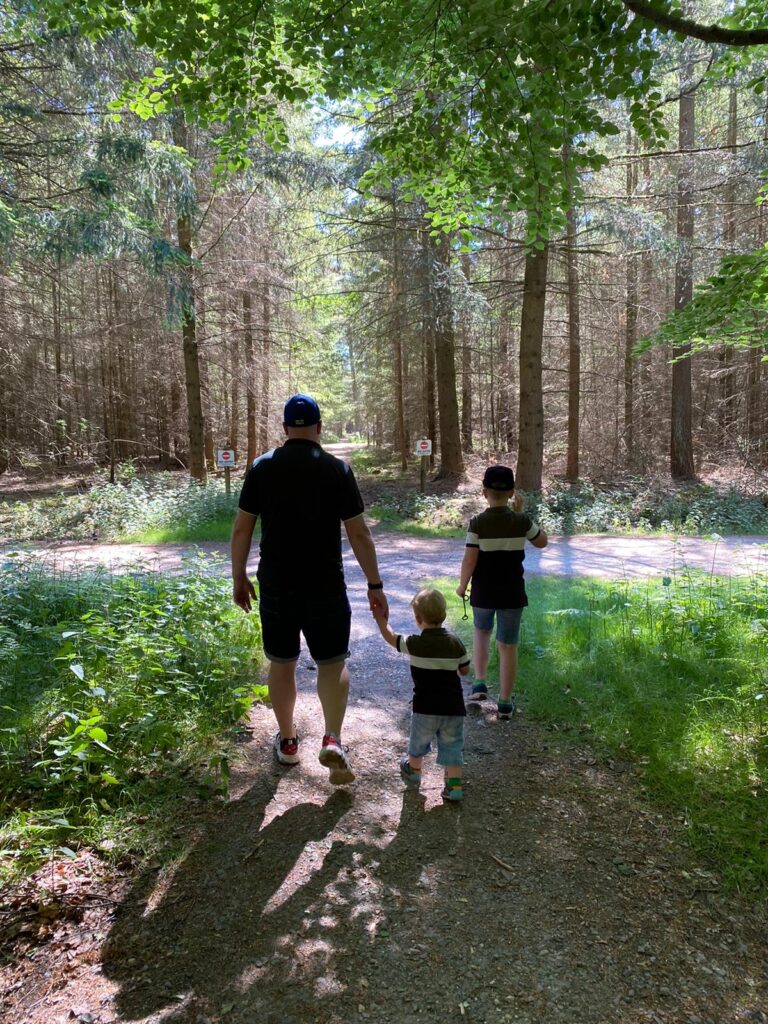My Son Benjamin: Living, Loving, and Learning with Smith-Magenis Syndrome

Being a father is supposed to be a straightforward thing.
You love your children, you do your best for them, and you help them grow into the best versions of themselves.
But life rarely fits that neatly into a plan, and for our family, the journey has been shaped by a condition I had never heard of before: Smith-Magenis Syndrome (SMS).
Earlier this year, my son Benjamin – who is now seven – was officially diagnosed with SMS, a rare genetic disorder that affects many aspects of his development. It was a diagnosis that brought some clarity to years of uncertainty, but it also came wrapped in a whirlwind of complex emotions, challenging decisions, and a relentless push for the support he needs but isn’t always given.
Benjamin is non-verbal and has displayed signs of special needs since around 18 months old. But even with mounting concerns and daily difficulties, it took years before the professionals agreed something more definitive was going on. What follows is our experience – the joy, the sadness, and the intense love of parenting a child with Smith-Magenis Syndrome. It is definitely frustration and heartbreak, yes, but also resilience, small victories, and an unconditional bond that words can’t quite capture.
The Early Years: Knowing Something Was Different
From the very beginning, Benjamin was unique. As a baby, he had behavioural tics that we were told to chalk up to the usual teething or developmental quirks. But things didn’t seem to settle. By the time he was a toddler, delays in speech and motor development became more evident. He struggled with language, communication and also with swallowing food. And in spite of this, there was always a jolly nature, a playfulness that gave us hope for the future.
As parents, we instinctively knew something wasn’t quite right. But we also clung to the idea that he was just “taking a little longer”. Unfortunately, these reassurances often came from professionals who dismissed our concerns. It wasn’t until we pushed harder, demanded assessments, and persevered through multiple referrals that we started getting answers.
The Diagnosis: Smith-Magenis Syndrome
When we finally received the diagnosis, it came like a bolt from the sky. Smith-Magenis Syndrome. A rare neurodevelopmental disorder caused by a deletion on chromosome 17. It was a condition I had to Google because I had never heard of it. And what I found scared me. Cognitive impairment, severe behavioural challenges, self-injury, sleep disorders, delayed speech and language… the list went on. But most striking of all was how completely it described Benjamin.
It was overwhelming. There was relief in having a name for what we were seeing, but also sadness – grief, even.
I can confess that a small piece of me died that day and that each day feels like you are grieving not necessarily for Benjamin but for the life we had imagined for him and for us. You dream certain dreams when your child is born, and SMS rewrote them all in one swift, clinical assessment.
Schooling Struggles: Square Peg, Round Hole

Perhaps the hardest ongoing challenge has been education.
Benjamin currently attends a mainstream primary school, but it has become increasingly clear that it isn’t the right environment for him. His needs are too complex for the setting he’s in – he requires constant support, tailored communication strategies, and sensory regulation, none of which can be properly delivered in a class of 25+ neurotypical children.
He doesn’t engage with the curriculum. He often becomes overwhelmed, lashing out or shutting down when his sensory needs aren’t met. His teaching assistants try their best, but they ultimately aren’t trained to handle the behavioural complexity that comes with SMS.
What makes it worse is the systemic barrier to accessing appropriate education. The process of applying for an Education, Health and Care Plan (EHCP) was slow and bureaucratic. Every form, every meeting feels like you have to convince someone that your child really does need help – despite the fact that it’s evident from anyone spending five minutes with him.
I find myself stuck between two competing emotions: fury at the lack of support and heartbreak watching my son becoming lost in an environment that truly doesn’t understand him or his needs.
Self-Injury and Frustration: The Moments That Break You
There are no words to describe what it feels like to watch your child hurt themselves. Benjamin has a particular pattern – when he’s overwhelmed, confused, or upset, he bangs his head against hard surfaces. Sometimes it’s the wall, sometimes the floor, sometimes furniture. The sound of it is awful. The sound of my son hurting himself because he cannot express what he needs.
You try everything. You safeguard the house. You intervene early. You use distraction techniques. But SMS is unpredictable. Benjamin can go from laughter to a full meltdown in seconds, triggered by something so small and fleeting it seems invisible to the rest of us.
And the truth is – there are times when I feel helpless. Useless in fact. Totally and utterly and completely useless. When the tantrum starts, when the banging begins, when the tears fall and he can’t tell me why… I just want to take it all away. I’d do anything to carry that pain for him, to free him from the frustration of a world that doesn’t make sense to him.
Sometimes I shout out loud. Sometimes I cry. Sometimes I’m silent. But being the parent of a child with SMS is exhausting in a way that’s hard to articulate. It is relentless. And yet…
I Wouldn’t Change Him for the World
For all the difficulties, all the moments where I feel phenomenally sad, there’s a simple truth that grounds me: Benjamin is extraordinary. Not in a sugar-coated, inspirational-poster kind of way, but in the truest, rawest sense.
He is affectionate and joyful. He lights up when he’s near his favourite people. He has quirks and routines that are entirely his own. He loves certain songs (Deadmau5 and Human League are personally favourites) and will dance from side to side when he hears them.
He has a unique way of communicating by gesturing to tell you his needs, but even though he rarely shows affection the fact that he asks you to do things for him means he trusts you, which to me is ok.
Yes, his condition is challenging. Yes, I worry endlessly about his future. But would I change him? No. Absolutely not.
I don’t love Benjamin despite his condition. I love Benjamin – including it. Because SMS is a part of him. And he is my son.
Fighting the System: Advocacy as a Daily Duty

Parenting a child with special needs isn’t just about being a parent…it’s about being an advocate, a researcher, a negotiator, and – at times – a fighter.
The number of hoops you’re expected to jump through to access basic support is astonishing! My wife and I have had to learn the jargon of special education, argue with local authorities, appeal decisions, and compile evidence like we’re preparing a legal case – just to get my son what he is entitled to. It’s dehumanising. It shouldn’t be this hard.
The system is not designed for children like Benjamin, and it certainly isn’t designed for exhausted parents already carrying the weight of the world on their shoulders. But we push forward because we have no choice. Because behind all the red tape is a child who deserves a chance to thrive.
Mental Health: The Silent Toll
There’s a silence around the mental health of parents of children with complex needs. I understand why – there’s guilt in admitting you’re struggling when your child’s needs are so much more urgent. But that silence can be crushing.
I’ve had days where I feel like I can’t do it anymore. Where I’ve questioned my ability to be the father Benjamin needs. Where I’ve felt isolated, left out from the world of neurotypical parenting, unable to share our reality without worrying it’ll make people uncomfortable.
But I’ve also learned that asking for help is not weakness – it’s survival. Support groups, online communities: they’re all part of the toolkit I use to stay afloat. Because I need to be OK – for Benjamin, for my family, and for myself.
The Future: Holding Hope and Uncertainty Together
Looking forward is complicated. I don’t know what adulthood will look like for Benjamin. I don’t know if he’ll ever speak, if he’ll ever live independently, or what kind of world he’ll inherit. But I do know that my wife and I will be there every step of the way.
We will fight for the right schooling. We will explore therapies and technologies that can help him communicate. We will build a community around him of people who see him – not just his condition.
Benjamin has taught me more about love, patience, and presence than I ever expected to learn. And while our road is different than most, it is filled with just as much meaning, just as much life.
Closing Thoughts
There’s no roadmap for parenting a child with Smith-Magenis Syndrome. It’s messy, painful, beautiful, chaotic, and deeply human. I’ve written this post not to ask for pity, but to offer a glimpse into what life looks like for families like mine – fathers like me.
Benjamin is not broken. He is not a problem to be fixed. He is a person to be loved and supported. He deserves a world that bends to meet him halfway, not one that forces him to conform.
So if you know a family like ours, reach out. If you’re a teacher, a health professional, a politician or policy maker – listen to us. And if you’re a fellow parent on this journey: I see you. I know how hard it is. And I know you wouldn’t change your child for the world, either.
Because they are our world.

Simon Chapman, Father to Benjamin
